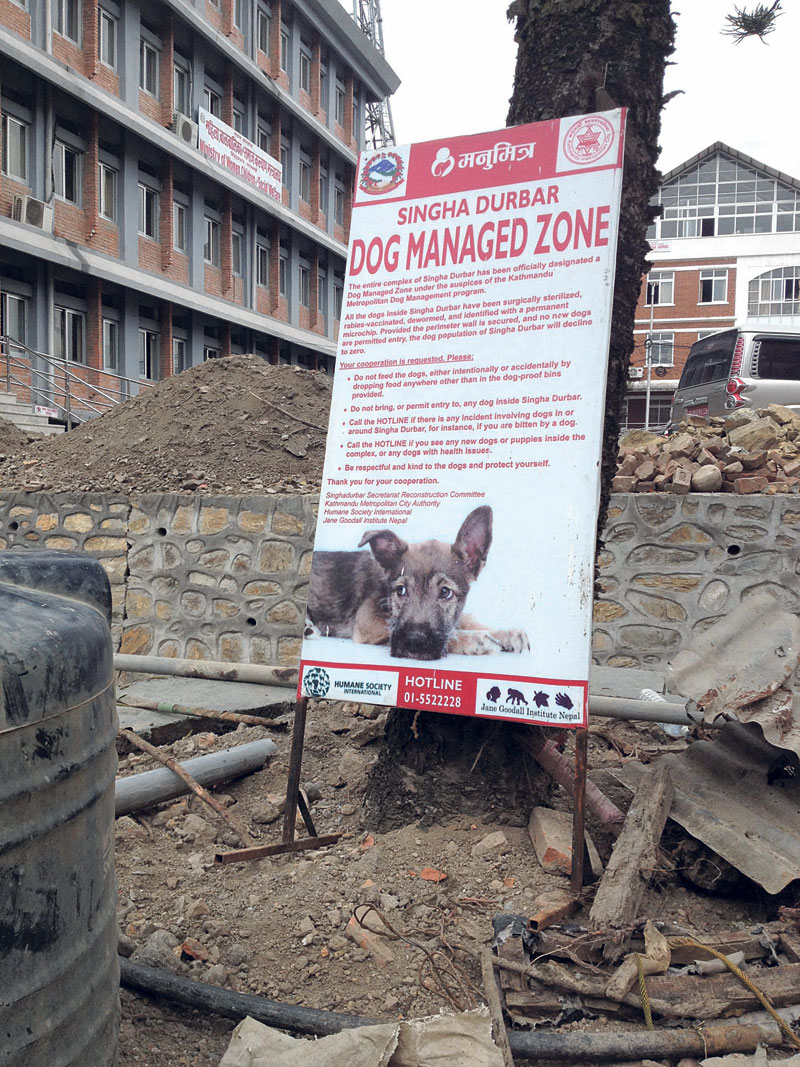KATHMANDU, June 27: The daily bustling life of Kathmandu observes the busy men, the polluting honkers, anxious luck hunters and untold stories of street animals. Though their stories is shared and even discussed by few of the commuters, plight of the animals remains the same.
Our metropolitan is home to a huge number of street animals, especially dogs and cows that feed on feed mostly on the leftovers. Concerns about animal rights and the need to protect them have been raised often by some organization working in this sector, but so far these calls have gone unattended.
According a recently conducted dog population survey by Animal Welfare Network Nepal, Humane Society International (HIS), The Jane Goodall Institute Nepal (JGI Nepal) and Kathmandu Metropolitan City (KMC) office, Kathmandu is home to around 21,856 street dogs. 7,431 are female and of them around 1,967 are nurturing puppies.
Along with dogs, Kathmandu is home to many stray cows and oxen. Concerned authorities have not documented their numbers so far. Many of these are injured and infected by various diseases that are not attended. A major cause of these injuries is road accident. To keep its street free of these cattle, KMC officials pick up these cattle and keep them at Kanji house for several days. This facility is impoverished and lacks basic infrastructure for keeping these animals. After detaining them here from several days, the office either auctions them or frees them into jungle.
Street vendors protest in front of KMC Office

Amid this grim picture, a ray of hope has now flickered for these animals. Recent initiatives of the KMC reflect that the office has started paying serious attention to the issue.
In 2015 it had officially banned killings of street dogs while considering the inhuman nature of the method to keep the city clean of stray dogs. With the decision, the population of street dogs in the capital has soared, almost becoming a serious concern for the commuters. In response, the office has now launched a campaign that aims at vaccinating and sterilizing Kathmandu’s dog.

[A poster at the Singha Durbar premise declaring the premise as a zone where dogs are managed. As part of its first dog management program (Manumitra), KMC has been sterilizing and taking care of dogs inside the premises.]/REPUBLICA
KMC, with support of HSI and JGI launched the three-year ‘One Health’ Dog Management Program piched as Manumitra. Through technical and partial financial support from HIS and JGI Nepal, the program aims sterilize and vaccinate at least 80 percent of street dogs in the capital.
Along with that, to create awareness among citizenry about animal rights and the right way to treat them, the program aims at conducting comprehensive educational awareness program at the community-level. Such campaign is expected to complement the sterilization and vaccination process.
In the first installment of the program, the Singha Durbar premise will be declared the first Dog Managed Zone, wherein all the dogs will be sterilized and vaccinated, collared, microchipped and well-groomed. “KMC will has launched this campaign with initial focus on core city areas,” Hari Kumar Shrestha, chief of Public Health Division at the office. “Humanely managing street dog population through sterilization and vaccination is known to improve health of dogs and also bring down rabies cases, improving health of the overall community,” Dr. Andrew Rowan, president and CEO of HIS said in a statement posted on the organization’s webpage.
Expert working on animal rights issues, however, are cautiously predicting the result of this campaign. Dr. Binaya Kumar Karna, senior veterinary officer at the Directorate of Animal Health, said “we cannot assure that every dog at in an area will be treated during the treatment period since they can commute anywhere. And the missed out ones could be a female who might produce unvaccinated offspring and move to another community.”
Pramada Shah, president of Animal Nepal, said that lack of animal welfare laws and awareness about animal rights among the citizenry are great barriers in securing living condition for the KMC’s street dogs.
“We don’t have laws that secure animal rights. People adopt or abandon dogs whenever and wherever they like. There is also lack of dissemination of knowledge among people about diseases and best practices to groom pets,” she said, adding that the government should come up with animal welfare laws to end inhumane behavior on street animal.






































